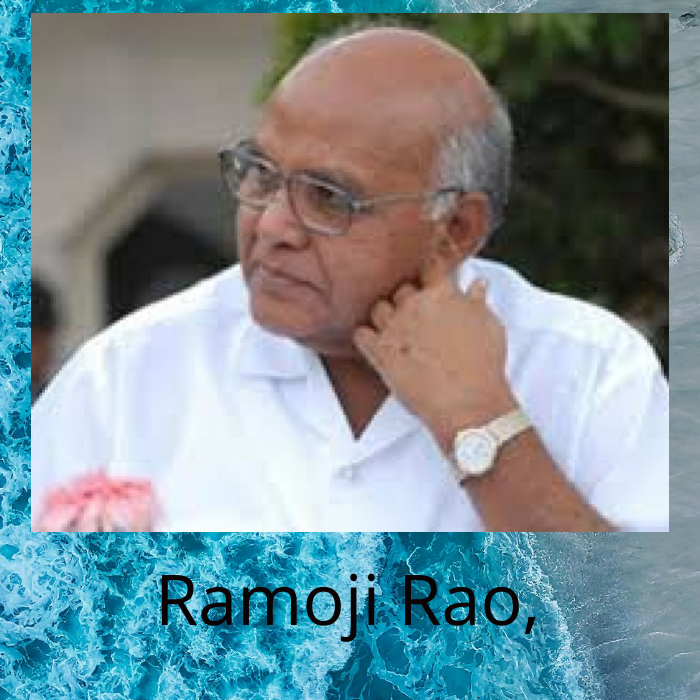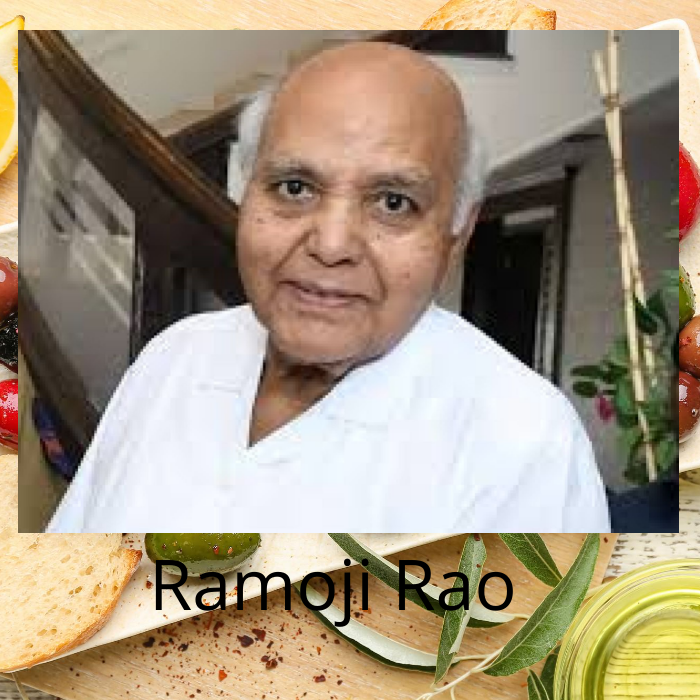Ramoji Rao
Cherukuri Ramoji Rao, recipient of the Padma Vibhushan award, passed away today at the age of 88. His career started as a small-scale Indian commodities exporter to the Soviet Union. He also founded and operated a very profitable chit fund company, sold pickles in bottles, and formed a hospitality organization. In addition, he started the Telugu and English newspapers that ruled the united Andhra Pradesh for many years, made multiple low-budget, critically acclaimed films, and played a significant role in establishing the Telugu Desam Party (TDP).
He was at the height of his popularity and influence by the time he was fifty, and a few months before he passed away, he was full of ideas that might compete with those of today’s bright young entrepreneurs. He clarified, saying, “The key is to use capital wisely,” in an interview with Business Standard some thirty years ago. You must be able to extract every last drop.” He was, of course, talking about the days when loans were expensive and banks were owned by the government. But up until the very end, this idea served as the cornerstone of his business strategy.
Ramoji Rao did not come from a wealthy family, despite what many people think. His parents arranged for him to wed Rama Devi, who went on to become his composed and reliable business and political companion. Rao belonged to the Kamma caste, which possessed the majority of the land in the undivided Andhra Pradesh (now Andhra Pradesh)’s lush, irrigated Krishna area. Even though he had very little financial support, he understood power. When he founded the Margadarsi Chit Fund in 1962, nobody had any idea what a chit fund was. These days, Margadarsi operates throughout Andhra Pradesh, Telangana, Karnataka, and Tamil Nadu, with an estimated turnover of 10,000 crore rupees.
Many years later, Subrata Roy Sahara and eager successors like Bandhan Bank imitated his concept. Agents would gather tiny sums from outlying villages at the start, which Margadarsi would then advance as needed. Customers could participate in prize lotteries with this account. The foundation of the chit fund industry was dependability, confidence, and a certain boldness, which Ramoji Rao never lacked. Utilizing funds from Margadarsi and encouragement from his spouse and her relatives, Ramoji Rao investigated numerous company ventures. In 1970, he was thinking of starting a Telugu newspaper, but he had first founded an advertising business.
In the meantime, there was a great deal of unrest in Indian politics, and Andhra Pradesh was no exception. Ramoji Rao thought about going into politics, but he saw more lucrative and politically advantageous prospects elsewhere. When it came to the Andhra Pradesh Assembly elections of 1983, Eenadu was a fervent supporter of the Telugu Desam Party (TDP), which was established in 1982 by the well-known and popular actor N.T. Rama Rao. One of the people who gave the TDP its “ideology”—Telugu pride, or “Atma Gauravam”—was Ramoji Rao.
This came after Rajiv Gandhi’s alleged insult to then-Chief Minister T. Anjaiah during a time of abrupt leadership changes in the Congress, which was in power at the center. When the TDP ran for office for the first time in 1983, the outcome was stunning: the party took 202 of the 294 assembly seats. Newsrooms in India and abroad spoke a lot about Eenadu’s front page at the time because it included a big photo of NTR waving at the Congress, seemingly telling them to get out of the state.On June 8th (Saturday), the Telugu community in Andhra Pradesh, Telangana, and throughout the world grieved the passing of their revered leader and creator of the Ramoji Group, Cherukuri Ramoji Rao.

After a brief illness, media mogul, entrepreneur, and philanthropist Ramoji Rao, who had been ailing lately, passed suddenly in a private Hyderabad hospital.
It may come as a surprise to many that Ramoji Rao started his business career in Visakhapatnam. On August 10, 1974, he established the Telugu daily Eenadu in this city of destiny.
After launching the first edition of Eenadu in an abandoned film studio in Seethamadhara, Ramoji Rao never looked back. The Telugu daily now has several branches and editions spread over different regions and cities.
The Eenadu Publishing Group, Ramoji Film City in Hyderabad, which is regarded as the largest film studio in the world, Margadarsi Chit Fund, Dolphin Group of Hotels, and numerous more businesses are included in the Ramoji Group.
Senior staff members remember Ramoji Rao distributing and advertising the newspaper by cruising the city on his Lambretta scooter. Almost three thousand of the 4,000 print copies he ordered when he first launched Eenadu were sold. A top executive in the advertising industry recalled that his background in the field allowed him to sustain the publication.
In Visakhapatnam, Ramoji Rao launched Kiran Ads, an advertising agency, to launch his career. After Eenadu became successful, he entered the hotel business and opened the Dolphin Hotel in Visakhapatnam in the early 1980s.
